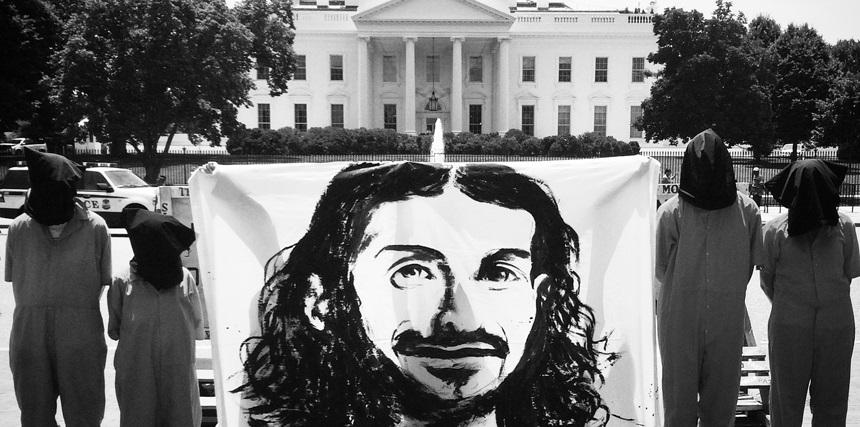I last saw Tariq Ba Odah in March, just one month after he completed the eighth year of an unbroken hunger strike in protest of his continued detention without charge at Guantánamo. Tariq’s lawyer, my colleague Omar Farah, and I didn’t need to exchange a word—Tariq was unrecognizable to us both. His skin, pasty and yellow, barely covered the bones protruding from his small frame. My hand could have wrapped entirely around his arm. Despite his usual smile, I could only think of Tariq on the verge of death, and the absurdity and cruelty of his situation.
There is no excuse for this. Rather than sounding the alarm, the Department of Defense is keeping up appearances, and feigning that they have the situation under control, while hiding Tariq away in solitary confinement in Camp 5. Tariq weighs about 75 pounds—that’s 56% of what someone his height and build should weigh and about as much as the average American boy at just 10 years old. But Tariq is 36. He has been imprisoned without charge since he was 23. And he has been on hunger strike for most of the years since.
What excuse could the Obama administration possibly have to continue delaying his freedom? None. It is the Defense Department’s gross negligence that has Tariq on the precipice of death, holding on to the only way he has of reflecting back what Guantánamo has done to him and others.
This week, CCR filed a motion in Tariq’s habeas case, asking a federal judge to order his immediate release. According to Army Regulation 190-8 –binding domestic law that incorporates the Geneva Convention and requires captives in U.S. military custody to be treated humanely – individuals who are seriously ill are eligible for direct repatriation. According to three medical experts who filed declarations in support our motion, Tariq is seriously ill, perhaps to the point of death. His shockingly low weight conclusively indicates that he is presenting “symptoms of severe malnourishment and starvation that are typically seen only in late and end-stage cancer or AIDS patients,” that he is in such a fragile state that a common cold or a fall could cause organ failure and imminent death, and that it is impossible for him to get the medical care he urgently requires in Guantánamo.
Tariq’s body is a metaphor for Guantánamo—and it shows, in excruciating detail, that neither can go on forever. To force-feed someone through their nose indefinitely, against established medical practice, and expect them to live is an experiment that will inevitably fail. Tariq is proof of this: the feeding regime intended to keep him “alive” has stopped working. After eight years, Tariq no longer appears able to absorb the calories and nutrients necessary to sustain activity and healing. “There is not one clinical study that I am aware of that demonstrates that adequate long-term nutritional support can be delivered via nasogastric enteral nutrition,” our medical expert concluded in his declaration. “There is likewise no responsible physician or health care facility in the country that would ever use a protocol that attempted to provide long-term nutritional support through [nasogastric] eternal feeding.”
Like the majority of Yemenis left at the prison and long cleared for release, it is politics that keeps Tariq in this hell: Republican propaganda that feeds off of fear and ignorance and the Defense Department’s insubordination on following the president’s orders to transfer people out of the prison.
But ultimately, it is President Obama who is responsible; Tariq bears the scars of his failed promises. I can’t help but think about his impassioned speech in 2013, at the height of a mass hunger strike:
“Imagine a future – ten years from now, or twenty years from now – when the United States of America is still holding people who have been charged with no crime on a piece of land that is not a part of our country. Look at the current situation, where we are force-feeding detainees who are holding a hunger strike. Is that who we are? Is that something that our Founders foresaw? Is that the America we want to leave to our children? Our sense of justice is stronger than that.”
Two years later, these words fill me with sadness and anger as I think of Tariq in his cell. This is who we are, but it doesn’t have to be. Tariq does not want to die, and dying should not be the price of his principled stance against one of the world’s most shameful, ongoing human rights violations. He deserves his health and his freedom.
Tariq has held on to hope and the strength of his spirit to endure the incredible injustice our government has done to him. I’m holding on to the hope that a court will hear our plea and finally order our client’s freedom.
“Freedom should be much more precious for the human being than all the desires on earth. And we should never give it up regardless of how expensive the price may be.” – Tariq Ba Odah, Guantánamo Bay, Cuba, 2013


